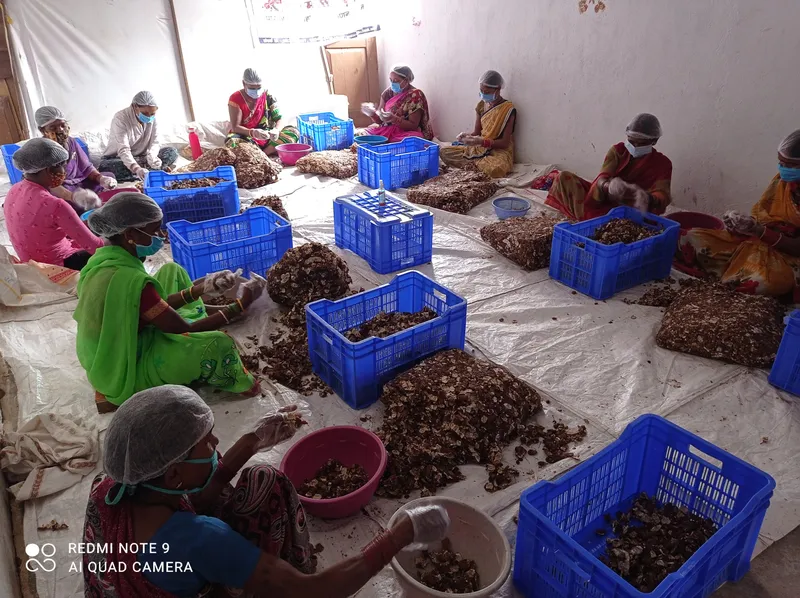How startups, FPOs can help smallholder farmers
A strong network of startups, farmer producer organisations (FPOs) and smallholder farmers can help drive sustainable agriculture in India.
Incubated by a robust startup ecosystem, thousands of young businesses are now building on India’s agricultural wealth by restoring farmland, pasture, and forests through a range of innovative, cost-effective, and sustainable solutions for farmers.
As the impacts of climate change and the availability of non-renewable resources worsen, these restorative businesses will only become more important for India, especially for 86% of its farmers that operate on an average of 0.6 hectares each..
More and more farmers are working on less land and have little understanding of modern farming methods and techniques developed by agri-entrepreneurs. Connecting small and marginal farmers, a growing number of whom are women, and these entrepreneurs can build a more equitable and sustainable food system for India. But how? At the core of the solution lie Farmer Producer Organisations (FPOs).
Equipping FPOs with entrepreneurial innovations
FPOs are government-supported organisations that group farmers – 70-80% of whom are small and marginal – and make them more efficient buyers of agricultural inputs, and more effective sellers of their products to fresh food wholesalers, retailers and large corporates sourcing raw materials. By pooling resources, they can also help farmers access new technologies that can improve their yields over the long run.
FPOs work in every agricultural value chain in India, from dairies to non-timber forest produce and poultry, and are a key part of the Government of India’s strategy to double farmer incomes, with Rs. 6865 crore now dedicated to promoting 10,000 new FPOs.
Adding to the 6,000 that already exist, more than 2,200 FPOs are scheduled to be created in 2021, many of which operate in high-value supply chains like organic produce and oilseeds.
Most FPOs are newly incorporated, incentivised by the various schemes offered by the union and state governments, and most have fewer than 1,000 farmer-members. These nascent organisations require not only technical support to help their members but also adequate capital and linkages to markets for their products.
With typical holdings of less than one hectare, farmers (especially lower-income women farmers) cannot individually afford to invest in mechanisation or technology to enhance productivity, procure key inputs at a low price, nor directly access buyers. Aggregation through FPOs is the only feasible option left for farmers to enhance their bargaining power and accrue more value.
Here is where startups can come in. Young businesses with the ambition to scale up and provide reliable real-time support to small farmers can benefit massively from working with FPOs.
Whether they serve as a guaranteed buyer of certain crops at a set and stable price or as a link to domestic and international markets for high-value crops, they can both build socioeconomic resilience into agricultural supply chains, improve food and nutritional security, and build strong businesses that create wealth in rural areas.
Yet this kind of collaboration between FPOs and startups hasn’t happened at scale, but several entrepreneurs that are working with the Land Accelerator South Asia programme, are leading the way and working with FPOs across India.
Tips on Working with FPOs

Tamarind harvesting by women farmers working with Adhimalai Pazhangudiyinar Producer Co
Aadhimalai Pazhangudiyinar Producer Co. works with more than 1,000 tribal shareholders from 160 villages in the Nilgiris Biosphere Reserve in Tamil Nadu. Sometimes, smallholders don’t have the necessary professional skills, political influence and finance needed to restore farms and forests.
In founder Jestin Paul’s experience, “FPOs that support small forest communities to manage forests based on sustainable extraction practices have achieved both forest protection and economic returns, he says. “Such FPOs and start-ups can benefit all if they collaborate well, especially the indigenous peoples and local communities with legal and customary rights to land that are most likely to successfully maintain ecosystems, although they can also be inefficient if poorly designed.”
Paul’s tips to his fellow entrepreneurs are to educate the farmers on the economic and ecological benefits of land restoration, but to start small.
He says that encouraging FPOs to help farmers to try out new technologies and techniques (without exposing them to added costs) can help them see the added revenues that investing in restoration can bring and facilitate the exchange of experiences between producers.
Bhushan Jambhekar, the startup founder of Vasumitra Life Energies, has learned that smallholders are hesitant to adopt a new product or technology because they have limited purchasing power and are looking for immediate benefits. He recommends that entrepreneurs invest in field demonstrations and on-farm meetings to directly show the benefits of new products and to offer services for lease or rent, as farmers may balk at the high up-front cost of buying.

Latylli SHG working with Jeev Anksh Eco Products
“Startups who are working with farmer communities should consider the social impact of their business model and how they can better the lives of the farmer community,” adds Gunajit Brahma, whose startup Jeev Anksh Eco Products links the organic and indigenous products grown by 10,000 farmers in Northeast India to markets.
The COVID-19 pandemic and lockdown have caused financial losses for many farmers. Gunajit says that responsible startups should invest in helping FPO shareholders recover now. In the future, they will remember who helped them in their time of trial, and this will build an ecosystem based on trust and mutual collaboration.
Entrepreneurs can help millions of smallholder farmers
Startups can empower millions of smallholder farmers to produce more, protect nature, reduce food loss and waste, and restore land. To nurture these mutually beneficial relationships, they need to build solutions that offer strong value for FPOs and their members.
To do that, their teams need to spend time in the field, learning about the problems farmers face and customising solutions for each local context and value chain. Without that grassroots work, start-ups risk alienating their customers, who are understandably wary of external experts disrupting how they farm, their only source income.
But startups can’t do this alone: They can benefit from a strong enabling environment and friendly regulations that make it easier for them to help. FPO partners need help building up transparent governance systems, strong business acumen, and management expertise.
Sustainability-focused accelerators that improve the capacity of the FPO management team and encourage them to form partnerships with startups can help both the FPO and the startup expand while keeping the environmental impact in mind.
Many farmer members of FPOs, especially women in marginalised social positions, have little agency in their organisations. Many heavily depend on the promoting organisation or resource institution to run the operations and take care of the business. In the long run, this lack of awareness and sense of ownership threatens the organisational sustainability of FPOs.
To remedy that, FPOs could explore a “two-tiered model” cited by Azim Premji University. A social impact enterprise, of which an FPO is the majority shareholder, can be set up at the district or block level as market-facing private limited companies. That would allow the FPO to focus exclusively on producing high-quality products. This structure would also enable increased investment of external capital.
India needs more collaboration between FPOs and startups working to restore land. Embracing this vision of radical cooperation, we can build a more prosperous, climate-resilient, and productive future for the Indian smallholder farmers.
Edited by Affirunisa Kankudti
(Disclaimer: The views and opinions expressed in this article are those of the author and do not necessarily reflect the views of YourStory.)







